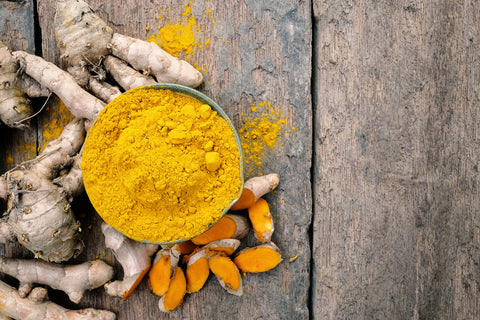Can Turmeric Cause Constipation? Reviewing The Science

If you've kept up with the prevailing science, then you know that turmeric is a hot topic in the naturopathic medicine world. And for a good reason! Clinical studies have found that this golden spice, famous for its use in curries and Ayurvedic medicine, can: 1 2
- Promote antioxidant activities by way of neutralizing free radicals
- Block inflammation-causing molecules from activating inflammation-related genes
- Reduce inflammation related to arthritis
- Improve brain function and lower your risk of certain neurological diseases
All this to say, modern science has shown that turmeric is a great spice with plenty of medical potential. However, turmeric also has its drawbacks. Chief among these is that its main active compound, curcumin, does not present with high bioavailability. (Bioavailability is how readily your body can access, process, or use a compound.) In this case, curcumin seems to be poorly absorbed and metabolized in the body. This leads to curcumin being eliminated as waste in your urine and stool, as opposed to being used by your cells. 2 3
You can potentially increase turmeric’s absorption – and therefore its bioavailability – by consuming piperine, a constituent of black pepper. However, scientists believe that one reason turmeric may have such low absorption is because it can promote gastrointestinal issues. One of the listed side effects of extended turmeric use is gastrointestinal distress. 2 3
So, of course, we thought we’d ask yet another question about turmeric’s effect on human health: can turmeric cause constipation?
Turmeric and Your Digestive System

Emerging clinical science has unearthed a treasure trove of data about turmeric – and its main constituent, curcumin. In the process, we have learned a lot about how turmeric reacts in the body, especially in the gastrointestinal tract (your digestive system). Note that we’re going to cover the role of both curcumin and turmeric in your digestive tract separately, as each presents in different ways.
Curcumin and Your Gastrointestinal Tract
For instance, we know that raw curcumin, such as curcumin extract, tends to gather in the intestines. Several clinical trials – ranging from studies on cancer to liver conditions – have found that curcumin accumulates in gastrointestinal tissues. Others have found that many of the benefits of orally administered curcumin localize in the intestines. Maintaining a primary area of effects further suggesting that the compound tends to conglomerate in the intestines. 3
For instance, orally administered curcumin is a powerful antioxidant in the body. However, some studies suggest that curcumin only reaches sufficient concentrations to promote antioxidant activities in the intestinal mucosa. 3
Turmeric and Your Gastrointestinal Tract
Fortunately, both turmeric and curcumin are considered relatively safe, with a low risk of toxicity. Turmeric is labeled by the U.S. Food and Drug Administration as FDA "Generally Recognized as Safe." 2 But while turmeric has many positive effects to its name, it does have a few side effects to watch out for. And unfortunately, a few of these take place in the gastrointestinal tract.
For instance, some studies have found that commercially prepared turmeric contains filler ingredients. These may include wheat or rye flour, as well as cassava starch or even barley. Individuals with celiac disease or other gluten intolerance disorders may find themselves at an increased risk of gastrointestinal side effects. 4
Additionally, incorporating turmeric as a regular part of your diet has been known to cause several gastrointestinal-related side effects, such as: 2 5
- Yellow stool
- Abdominal pain
- Digestive problems
- Nausea
- Diarrhea
You'll notice that the last of these side effects listed – diarrhea – is the opposite of constipation. So, it’s prudent to ask, can turmeric cause constipation – or treat it?
Turmeric and Irritable Bowel Syndrome

This question's answer lies in clinical studies that examine turmeric's effects on irritable bowel syndrome – IBS.
Irritable bowel syndrome, sometimes called irritable bowel disease, is an intestinal disorder that causes pain in the stomach and large intestine. This chronic condition is not curable. Instead, individuals with IBS learn to manage their disorder symptoms through medication, lifestyle changes, and a healthy diet. While symptoms vary, the most common include: 2 6 8
- Abdominal pain
- Cramping and bloating
- Diarrhea
- Constipation
As modern science has delved into potential cures and treatments for IBS, one slightly surprising answer seems to lie with curcumin – the main active ingredient in turmeric! In fact, curcumin appears to help a number of inflammatory intestinal-related diseases, such as IBS, Crohn’s disease, and even various types of ulcers. 2 8
Turmeric and IBS in Scientific Literature
One of the first pilot studies – which was partially blinded and randomized – otherwise healthy patients with IBS symptoms were given two doses of turmeric in tablet form. The first group, which contained 102 patients, received one tablet of 72-milligram standardized turmeric extract per day for eight weeks. The second group, which had 105 patients, received two 72 milligram tablets per day for eight weeks. At the end of this time, the authors concluded that: 7 8
- 53% of patients in the first group experienced IBS symptom relief
- 60% of patients in the second group experienced IBS symptom relief
- Turmeric was associated with a “marked decrease” in IBS symptoms across the board
- Pain and discomfort reduced by 22% in the first group and 25% in the second group
- Both groups reported a “favorable shift” in self-reported bowel patterns
However, the authors also noted that more clinical trials are needed to confirm their results due to a lack of literature on the subject.
Can Turmeric Cause Constipation?

Overall, current evidence on the subject seems to suggest that turmeric does not usually cause constipation. In fact, preliminary research into the effect of turmeric on IBS shows that turmeric may actually help constipation in some cases. However, this research is early – only a handful of studies thus far – which means that more evidence is needed to back up these claims.
Having Bowel Issues? Check Out Wellixir's Organic Turmeric Products!
IBS and other bowel/digestive issues are extremely common nowadays. You can promote your digestive health to best prepare for these episodes and to potentially prevent them from happening as often.
One way you might be able to do that is with Wellixir's organic turmeric supplements! Utilizing the highest quality turmeric and curcumin, this supplement is loaded with everything you need!
References
- https://www.healthline.com/nutrition/top-10-evidence-based-health-benefits-of-turmeric
- https://www.ncbi.nlm.nih.gov/pmc/articles/PMC5664031/
- https://lpi.oregonstate.edu/mic/dietary-factors/phytochemicals/curcumin
- https://www.healthline.com/nutrition/turmeric-side-effects
- https://www.medicalnewstoday.com/articles/320643#side-effects
- https://www.mayoclinic.org/diseases-conditions/irritable-bowel-syndrome/symptoms-causes/syc-20360016
- https://pubmed.ncbi.nlm.nih.gov/15673996/
- https://www.ncbi.nlm.nih.gov/pmc/articles/PMC3535097/


